The Romans had their own unique religion and religious observance was important for both family and state. Festival and ritual were commonplace and were occasions of great merriment.
Every Roman house had a sacred fire, and people believed that the lit fire would protect the family. When the fire went out, they thought that something terrible would happen in the family. The Romans had their own gods too such as Jupiter (Zeus), Juno (Hera), Minerva (Athena), and many others.
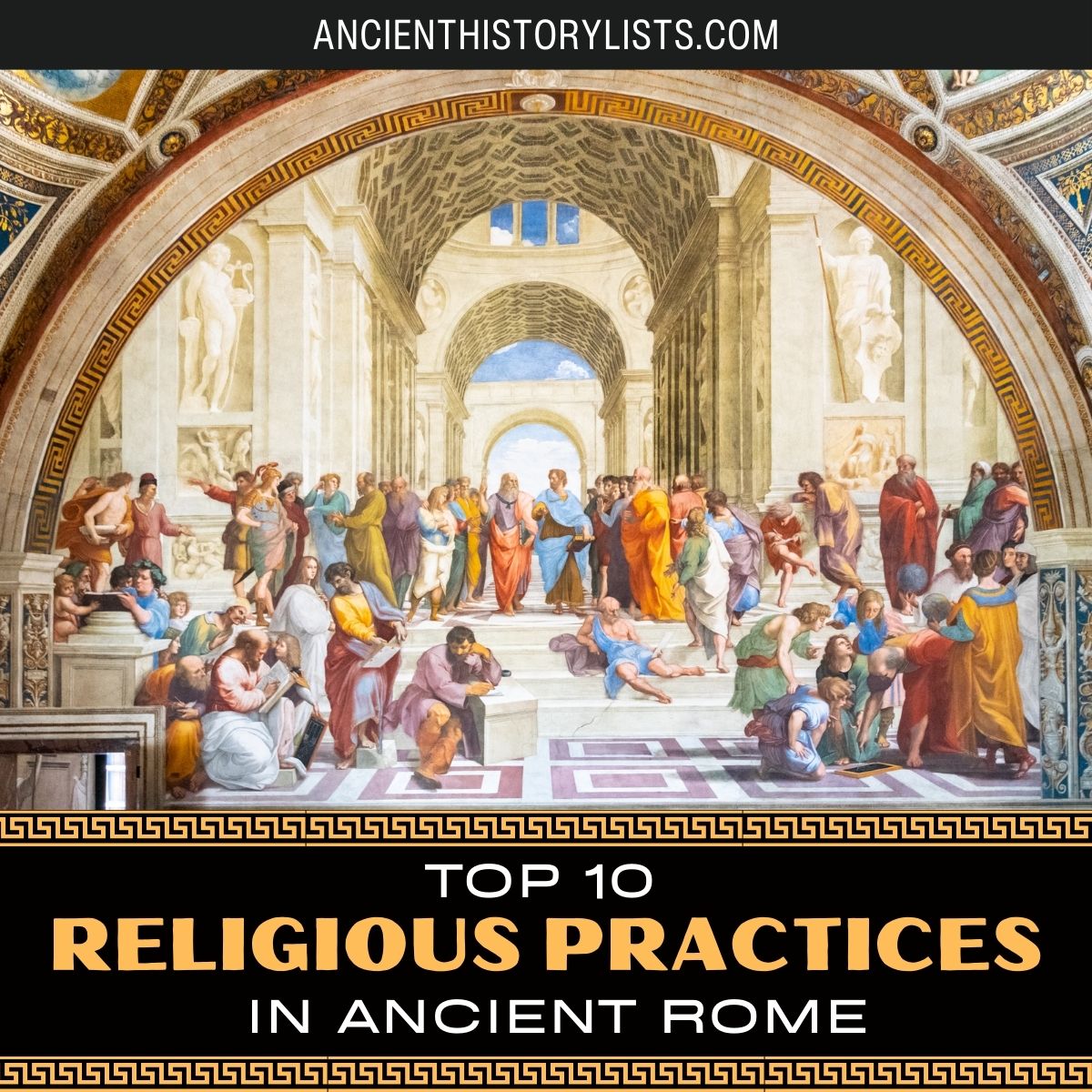
During the first century AD, the Romans copied the Greek gods, changing their names and attributes to suit their own needs. Although Roman religion changed profoundly after the introduction of Christianity, here, we are focusing on the 10 major religious practices in ancient Rome before Christianity:
10. Animal and Human Sacrifice
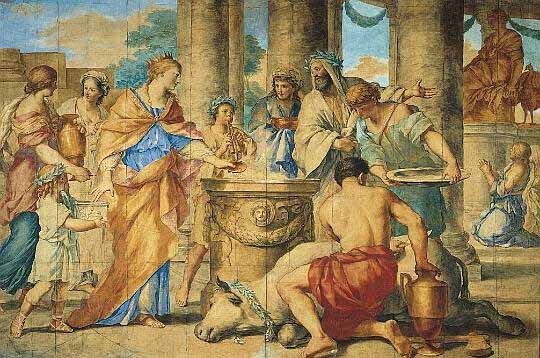
Sacrifice was a fundamental practice in many Roman ceremonies as the Romans believed that they would have good fortune if the gods were happy. In order to make the Roman gods happy, several sacrifices were practiced in ancient Rome, and each sacrifice was highly ritualized.
Animal Sacrifice
- The sex of the animal should be the same as the sex of the god.
- White animals were sacrificed to the gods of the upper world, whereas black animals were sacrificed to the gods of the underworld.
- Before any animal was sacrificed, the innards were removed to ensure the purity of the sacrifice.
- During the Second Punic War, there was a promise made to Jupiter that every animal born during that period would offer five years’ more protection from Hannibal and his allies.
- The most common form of sacrifice was suovetaurilia or solitaurilia, which involved the sacrifice of a pig, sheep, or ox.
Human Sacrifice
- Human sacrifice was rare. Gladiatorial contests were first introduced to Rome in 264 BC in honor of the dead. At first, the contestants were volunteers who enacted mythical struggles and death was not common. Later, slaves and criminals were used in the contests and sacrificed to the “manes,” or the souls of the dead, on behalf of the deceased.
- Two rebel soldiers who attempted an insurrection in Rome were sacrificed to Mars in the Campus Martius by the pontifices and the Flamen Martialis or high priest. Their heads were displayed at the Regia in Rome.
9. Religious Festivals
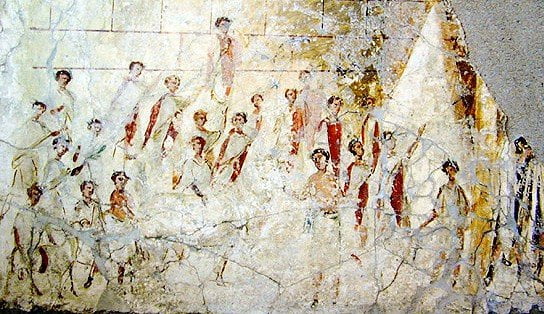
There were many festivals celebrated in Rome in honor of the gods. Festivals were celebrated throughout Rome, and citizens were required to close their businesses during religious ceremonies. The sacrificial meat was offered to the Romans in most of the festivals. The most common Roman festivals were:
Adonia (July): Female members of the household would climb on the roof of the house and plant the “Garden of Adonis” which mostly contained fast-growing plants. The women then took care of the garden for eight months before abandoning it and mourning the plants once they had died. They also staged a sacred play showing the wedding of Venus and Adonis, which was based on Greek tradition.
Agonalia (January 1 & 9): Romans offered figs, dates, and honey sealed in white jars to the god Janus. The gift of money to family members was quite popular in this festival too.
The complete lists of Roman festivals can be found at here.
8. The Romans Copied the Greek Gods
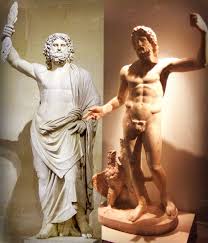
The Romans took the Greek gods and changed their names, and the Greek gods had a major influence on Roman religion. The first Greek gods adopted by the Romans were the twin gods Castor and Polydeuces in 484 BC. Soon, many other gods were added to the list. One difference between the Greek and Roman traditions was that the Romans used marble to build their statues whereas the Greeks used bronze.
Some of the major gods in Rome were influenced by the Greeks:
| Roman God | Greek Origin |
|---|---|
| Apollo | Apollo |
| Ceres | Demeter |
| Diana | Artemis |
| Juno | Hera |
| Jupiter | Zeus |
| Mars | Ares |
| Mercury | Hermes |
| Minerva | Athena |
| Neptune | Poseidon |
| Vesta | Hestia |
| Vulcan | Hephaestus |
See also:
7. Numina
The early Romans believed that there were spirit-like forces called Numina that controlled many aspects of their lives. They thought that everything in nature and the things around them were created by Numina such as lunar and solar eclipses, the flowing of rivers, and any military outcomes.
6. The Romans Worshiped Many Different Gods

Most ancient civilizations worshiped many different gods, and the Romans were no different. Each of the gods has their own purpose and value. As the empire evolved, new gods evolved with it.
Some popular Roman gods:
Jupiter (Male): The main Roman god
Juno (Female): Wife of Jupiter and goddess of women and fertility
Mars (Male): God of war
Venus (Female): Goddess of love and beauty
Minerva (Female): Goddess of wisdom, arts and crafts, learning, and industry
Neptune (Male): God of the sea
Ceres (Female): Goddess of harvest
Vulcan (Male): God of the underworld
Diana (Female): Goddess of hunting
Bacchus (Male):God of wine
Mercury (Male): Messenger to the gods
Vesta (Female): Goddess of the hearth and home
5. Superstition in Roman Religion
Superstition played a big part in the ancient Roman relationship between gods and humans. The Romans believed in different omens for good or bad luck. For example, they thought that picking up a discarded horseshoe would grant them good luck. It was believed that women would be lucky if they combed their hair with the spear of a dead man (the more recently dead, the better). The words “Bona Salus” were commonly used as a blessing by the Romans when someone sneezed.
There were many signs of bad luck as well. For example, the Romans believed that the crow was a bad omen. It was believed to be bad luck to enter a house with the left foot first. It was also bad luck to have a cow on top of your house. A snake falling from the roof to the yard was bad luck, and a black cat entering the house or a split ceiling beam were considered omens of natural disaster.
4. Prayers, Vows, and Oaths
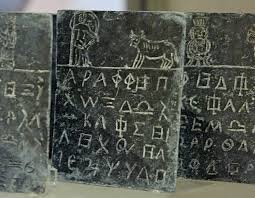
Every sacrifice and offering to the gods required prayer. A sacrifice without a prayer, vow, or oath was considered useless. Prayers were often said as a community and led by the priest. Prayers had to be very specific and exact. If any small mistake was made, the prayer had to be started all over again, or sometimes the entire festival had to be repeated. The Romans believed that an oath was a sacred bond which could not be broken.
3. Funerals and the Afterlife
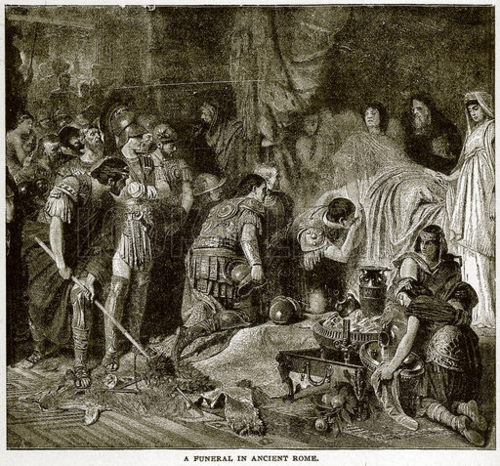
The way in which the dead are treated changes with every civilization in history and the Romans had their own specific traditions. Over time, there have been significant changes in their beliefs regarding the handling of the dead and the concept of the afterlife, especially with the introduction of Christianity.
The Romans followed a very specific series of steps when dealing with the bodies of the dead. A relative would close the eyes of the dead body, calling the name of the departed. The body was then washed and a coin was place in the mouth. The coin was to pay Charon, who carried the dead across the river into the underworld.
The social status of the individual determined the length of time he or she was put on display for. If the person was from an upper-class family, the body was put on display for as long as a week. Lower-class members of the public were put on display for only a day. The funeral was generally held at night to discourage large public gatherings. In the case of major political figures, musicians led the parade, followed by family mourners who often carried portrait sculptures or wax masks of other dead family members.
Funeral societies called collegia handled the proper burial of the body. They were paid monthly wages, and guaranteed a spot in the columbarium.
2. Temples and Shrines
Roman temples were among the most versatile architectural designs of the ancient era and were based on the Etruscan model. Romans temples were unique but were hugely influenced by the Greeks and Etruscans.
The temples typically emphasized the front aspect, having high podiums with steps. The temples also had deep colonnade porticos in front of the cella or inner chamber. Most of the temples were built from concrete and brick, but later they were furnished with expensive stone and marble.
The Romans had separate temples for each god, but if multiple gods had to be worshiped in one temple, each of the gods had their own icon and cella.
1. Judaism and Christianity
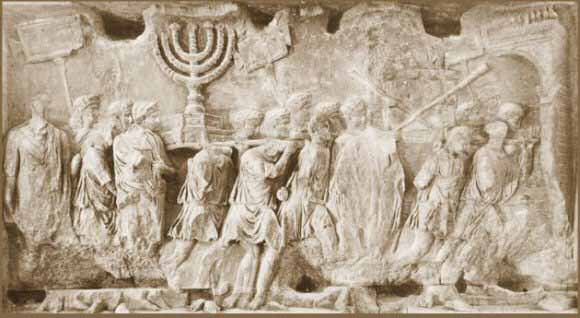
Judaism and Christianity were two emerging religions that didn’t worship the major Romans gods. After the emergence of Christianity, the concept of different gods for specific purposes slowly started to fade away.
Conclusion
Religion in ancient Rome quietly diversified over time. However, religion always played a very important part in daily life despite numerous changes in belief and practice. Religious festivals and ceremonies were common, popular events involving the whole community.